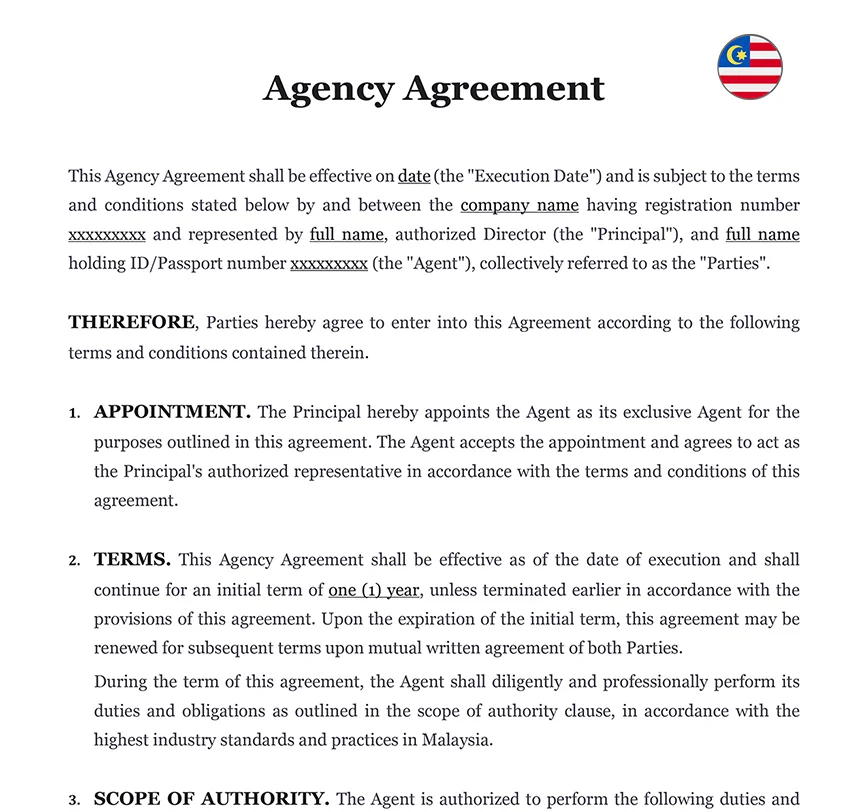Ready to use legal template
Drafted by experienced lawyers
Compliant with Hong Kong law
Ready to use legal template
Drafted by lawyers
Compliant with Hong Kong law
Home › Business contracts › Agency Agreement
Learn more about Agency Agreement in Hong Kong
An Agency Agreement is a legally binding contract that establishes a relationship between a principal and an agent, allowing the agent to act on behalf of the principal in business transactions. This agreement is essential for businesses operating in Hong Kong, as it clearly defines the scope of authority, responsibilities, and compensation of the agent while safeguarding the interests of both parties. A well-drafted Agency Agreement helps prevent disputes, ensures compliance with local laws, and provides a solid foundation for commercial partnerships. Whether appointing a sales agent, distributor, or representative, having a professionally prepared agreement is crucial for clarity and legal protection. Download our Agency Agreement, expertly drafted, easy to edit in Word format, to establish your agency relationship with confidence.
Table of contents
-
What is an Agency Agreement in Hong Kong?
-
What is included in this Agency Agreement?
-
What are the rights and responsibilities of an agent?
-
How do commission payments work in an Agency Agreement?
-
Is a foreign company allowed to appoint an agent in Hong Kong?
-
How can I terminate an Agency Agreement in Hong Kong?
-
What happens if an agent breaches the Agency Contract?
-
Can an agent represent multiple principals under the same agreement?
-
Can a Principal be held liable for an agent’s actions in Hong Kong?
What is an Agency Agreement in Hong Kong?
An Agency Agreement in Hong Kong is a legally binding contract in which one party (the principal) authorizes another (the agent) to act on its behalf in a business context. The agent may negotiate deals, market services, collect payments, or perform specific functions within the scope of authority granted.
The relationship must be clearly defined to avoid misrepresentation or liability, especially when the agent is dealing with third parties. According to the Hong Kong Companies Registry, all business arrangements involving local agents should be backed by proper documentation.
What is included in this Agency Agreement?
A comprehensive Agency Agreement in Hong Kong includes the following key clauses:
| ➤ Appointment: Designates the agent as the exclusive or non-exclusive representative of the principal in Hong Kong. |
| ➤ Terms: Specifies the agreement duration, usually one year, with an option for renewal through mutual consent. |
| ➤ Scope of Authority: Authorizes the agent to conduct market research, attend meetings, and represent the brand under defined limits. |
| ➤ Limitations of Authority: Prohibits the agent from binding the principal or making unauthorized decisions. |
| ➤ Commission and Compensation: Defines the payment structure, typically based on a percentage of net sales, payable monthly or quarterly. |
| ➤ Confidentiality: Requires both parties to keep proprietary information secret during and after the agreement. |
| ➤ Intellectual Property: Establishes that all trademarks and marketing content remain the property of the principal. |
| ➤ Non-Competition: Restricts the agent from engaging in activities or working with competitors for two years post-termination. |
| ➤ Non-Solicitation: Prevents the agent from contacting the principal’s clients, partners, or staff after the agreement ends. |
| ➤ Termination: Allows termination with written notice or immediately in the event of breach after a 30-day cure period. |
| ➤ Dispute Resolution: Requires disputes to be settled via negotiation, then mediation, then arbitration if unresolved. |
| ➤ Force Majeure: Exempts parties from liability for non-performance due to events beyond their control. |
| ➤ Entire Agreement: Confirms that the document is the final and complete agreement. |
| ➤ Governing Law and Jurisdiction: Establishes that Hong Kong law applies and disputes are resolved in local courts. |
| ➤ Documents Attached: Lists identification and registration documents from both parties. |




